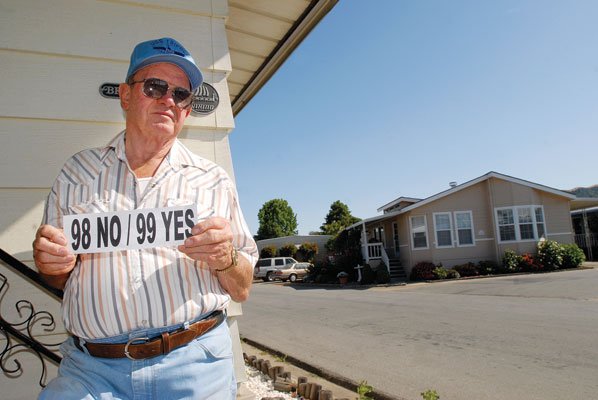Talk to almost anyone at the Pacific Mobile Estate in south
Gilroy, and it’s the same: No on 98, Yes on 99.
Talk to almost anyone at the Pacific Mobile Estate in south Gilroy, and it’s the same: No on 98, Yes on 99.
Dick Janisch even made bumper stickers and said he has tried to educate his neighbors that greedy landlords snuck rent control language into Proposition 98.
“I’m not for eminent domain, but when they snuck that rent control deal underneath it, I said, ‘No, no, no,'” Janisch said over a cup of coffee with a few of his neighbors Wednesday afternoon in the lobby of the park at 500 W. 10th St.
Proposition 98 aims to limit the government’s ability to seize private property, but it also includes language that would gradually phase out rent control across the state. Janisch and the Gilroy City Council, which voted last month to oppose the measure, agree who’s behind it.
“The majority of the funding to qualify this measure comes from wealthy apartment and mobile home park owners who are attempting to trick voters into abolishing rent control and other renter protections, thereby jeopardizing an important affordable housing tool to protect working families, seniors, single-parent homes, veterans and others,” reads the resolution.
If 98 passes, residents would continue to pay their same monthly rents, which range from about $500 to $800, but as soon as they sell, the park’s owner, Don Jurrow, could raise the rent without any more state restrictions. Jurrow declined to comment, and his lawyer did not return multiple messages.
Another what-if looming over residents is Jurrow’s stalled conversion plans.
Last year Jurrow aimed to convert his 178 rental plots into condominium units. Since the market has taken a nose dive, however, Jurrow has yet to inform residents what the appraised value of their lots are. While there are some who favor conversion, others bemoan hefty property taxes, insurance payments and other fees, and if Jurrow goes ahead with the conversion plan after the market recovers, then residents could choose to buy their plots or continue to rent.
Those such as Janisch who earn more than $59,400 a year and opt to rent, however, would gradually lose their rent controlled rates because they do not qualify as state-protected, “low income” residents. Janisch said he worried his rate could double or triple over a few years. About 80 percent of the park’s tenants qualify as low income, according to residents. But if Proposition 98 passes, the point becomes moot because all remaining renters would eventually lose their protected rents.
“Once they get this thing passed, they’ll just run with it,” said Mel Plummer, a four-year resident who pays about $700 a month now. “The trouble with people in the park is just like voters: They don’t research.”
Janisch, who pays about $700 a month, and Betty Brescoll, a 10-year resident who pays $570 a month, both likened Proposition 98 to the utilities tax measure on the ballot last November. That measure lowered telephone and video users’ taxes from 5 percent to 4.5, but it broadened the scope of the tax to include satellite TV and other technologies. With more and more folks going digital, Janisch and Brescoll said, residents will end up paying more in the future.
“That was like offering a voter five bucks and then taking 20 dollars out of their back pocket,” Janisch said. “It’s the same thing all over again now.”
“Once rent control is gone, the landlord will want to get all the old mobile homes out of here and bring in new ones,” Brescoll said. “But Jurrow never talks to the people about this.”
Brescoll pointed to the lot for sale across from her mobile home as an indication of the down market she said Jurrow is waiting out and of the higher rate the new renter will have to pay even if 98 does not pass. Every year rent goes up $30 or $40 to adjust for cost of living, residents said, and when someone moves out, Jurrow inches the rate up about the same, they added. Residents said they worry that prices will only go up indefinitely with 98 and the potential conversion.
The park, which has operated at the site for at least two decades, exclusively served elderly retirees such as Brescoll and Janisch until the early 1990s, when changes in state law allowed younger families to start trickling in, according to City Planning Manager Bill Faus.
Now it appears another change is on the horizon.
“I’m pessimistic,” Brescoll said of Proposition 98 passing, “but there’s been a lot in the media about it, so hopefully people will know the truth.”
By the Numbers
■ 80 percent of park’s tenants qualify as low income.
■ $500 to $800: Average monthly rent.
■ $30 to $40: Average annual cost-of-living increases.














